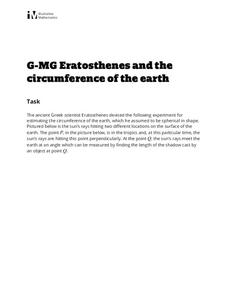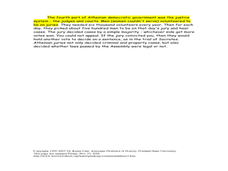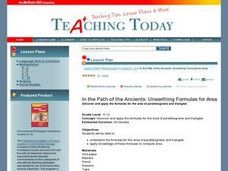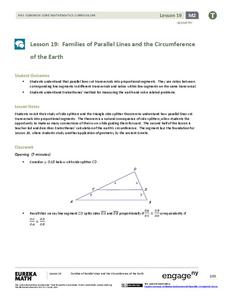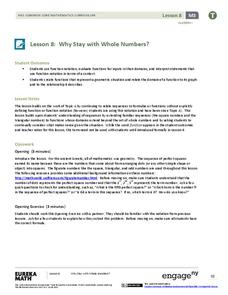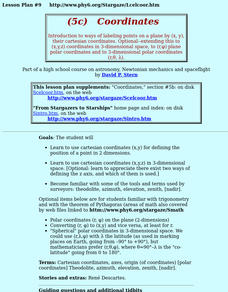Illustrative Mathematics
Eratosthenes and the Circumference of the Earth
The class gets to practice being a mathematician in ancient Greece, performing geometric application problems in the way of Eratosthenes. After following the steps of the great mathematicians, they then compare the (surprisingly...
Curated OER
Ancient Story Problems
Pupils research ancient civilizations, and develop story problems using symbols and coins from those times. They retell these story problems using modern terms and coins.
Curated OER
Geometry, Pi, and Ancient Civilizations
By working together, pairs of students will complete a Pi webquest. Using the internet, they examine the ways people in the Ancient Civilizations of Egypt, Babylonia and Greece used Pi. To end the lesson, they review the concepts of...
Curated OER
Architecture and Democracy
Fifth graders contrast and compare ancient Greece to the U.S.A. In this Greek History activity, 5th graders investigate the buildings and designs of ancient Greece, as well as their democracy and government. Students answer...
Curated OER
Coin Content
Pupils calculate ancient Greek coin values as compared to their weight, equivalence in grain, and determine their worth today. They explain how to calculate fractions of a given weight and how to use decimal numbers.
Curated OER
In the Path of the Ancients: Unearthing Formulas for Area
Students apply the formulas for the area of parallelograms and triangles. Through guided practice, students discover the correct way to apply the formulas. Working in pairs, they write their own problems featuring the formulas.
Curated OER
Discovering Math: Concepts in Algebra
Young scholars learn that speed is a function of time and distance, a quadratic equation can be used to figure out the path of fireworks, a photographer can use Algebra to figure out how many rolls he can afford if he needs twice as much...
Curated OER
Measuring the Earth (Eratoshenes' method)
Sixth graders engage in problem solving, communicating, reasoning, and connecting to represent and solve problems, using geometric models.
Curated OER
Coin Content
Students calculate ancient Greek coin values as compared to their weight, and equivalence in grain. They then determine their worth today. They convert metric to U.S. customary weight systems.
EngageNY
Families of Parallel Lines and the Circumference of the Earth
How do you fit a tape measure around the Earth? No need if you know a little geometry! Pupils begin by extending their understanding of the Side Splitter Theorem to a transversal cut by parallel lines. Once they identify the...
EngageNY
Why Stay with Whole Numbers?
Domain can be a tricky topic, especially when you relate it to context, but here is a instructional activity that provides concrete examples of discrete situations and those that are continuous. It also addresses where the input values...
Curated OER
Growing Money
Fourth graders sell plants. In this business lesson students propagate plants from cuttings. Students create a business to sell the plants they grow.
Curated OER
Symmetry in Paper Airplanes
Students explore symmetry. In this geometry and scientific inquiry lesson, students design paper airplanes with middle line symmetry, as well as right, obtuse, and acute angles. Students measure the plane's angles using a...
Curated OER
Do You Have a Sinking Feeling
Students determine how marine archaeologists use historical and archaeological data to draw inferences about shipwrecks. Students plot the position of a shipwrecked vessel, and draw inferences about the shipwreck from artifacts that have...
Curated OER
Are You a Golden Ratio?
Students explore the concept of the golden ratio in nature and architectural design. They discuss examples such as petals on a sunflower and the Parthenon. In small groups they take turns measuring their body parts to find a golden ratio.
Curated OER
Prime and Composite Numbers
Sixth graders identify prime and composite numbers and complete an activity problem. Given a 100 chart, they follow directions to create a prime number chart. In groups, 6th graders play a "Prime Take Away" activity to reinforce prime...
Curated OER
Platonic Solids
Students identify different types of polygons. In this geometry lesson, students differentiate between convex and regular shapes. they identify the names of two and three-dimensional objects.
Curated OER
Discovering Math Concepts in Advanced Algebra
Students explore the concept of Chinese contributions in mathematics. For this Chinese contributions in mathematics lesson, students research Chinese achievements in mathematics. Students solve 3x3 systems of equations using the method...
Curated OER
Coordinates
High schoolers use cartesian coordinates (x,y,z) in 3-dimensional space. [Optional: appreciate there exist two ways of defining the z axis, and which of them is used.] They become familiar with the tools and terms used by surveyors.
Curated OER
The Truth About Triangles and Squares
Fourth graders investigate the patterns associated with both triangular and square numbers. They use counters as manipulatives to depict the numbers as needed but focus on problem solving using mental math techniques.
Curated OER
Duplicating Segments and Angles
Tenth graders investigate geometric construction. In this geometry lesson, 10th graders explore the procedure for copying an angle and a segment. The lesson emphasizes the difference between a sketch, a drawing, and a...
Other popular searches
- Ancient Greece Word Search
- Ancient Greece and Rome
- Ancient Greece Geography
- Ancient Greece Map
- Ancient Greece Olympics
- Geography of Ancient Greece
- Ancient Greece Lesson Plans
- Ancient Greece Democracy
- Government in Ancient Greece
- Art of Ancient Greece
- Ancient Greece Websites
- Ancient Greece Map Activity
